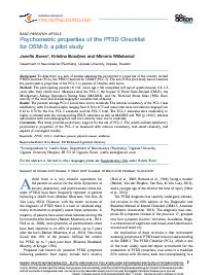Psychometric properties of the PTSD Checklist for DSM-5 : a pilot study
Background: To date there is a lack of studies assessing the psychometric properties of the recently revised PTSD Checklist (PCL), the PTSD Checklist for DSM-5 (PCL-5). The aim of this pilot study was to examine the psychometric properties of the PCL-5 in parents of children with burns.
Methods: The participating parents (N=62, mean age=38) completed self-report questionnaires, 0.8–5.6 years after their child’s burn. Measures were the PCL-5, the Impact of Event Scale-Revised (IES-R), the Montgomery–Åsberg Depression Rating Scale (MADRS), and the Perceived Stress Scale (PSS). Burn severity of the child and sociodemographic variables was obtained.
Results: The parents’ average PCL-5 scores were low to moderate. The internal consistency of the PCL-5 was satisfactory, with Cronbach’s alpha ranging from 0.56 to 0.77 and mean inter-item correlations ranging from 0.22 to 0.73 for the four PCL-5 subscales and the PCL-5 total. The PCL-5 subscales were moderately to highly correlated with the corresponding IES-R subscales as well as MADRS and PSS (p<0.05), whereas associations with sociodemographics and burn severity were low to moderate.
Conclusions: This study provides preliminary support for the use of PCL-5. The results indicate satisfactory psychometric properties of the PCL-5 as measured with internal consistency, test–retest reliability, and aspects of convergent validity.
In: European journal of psychotraumatology, ISSN 2000-8066 | 7 | April | 30165
http://dx.doi.org/10.3402/ejpt.v7.30165


